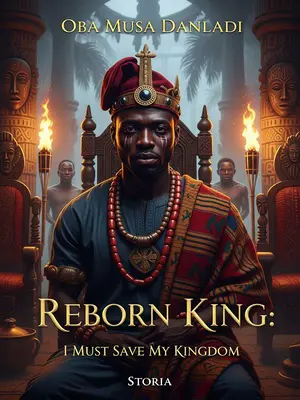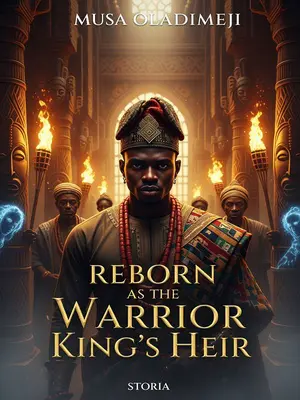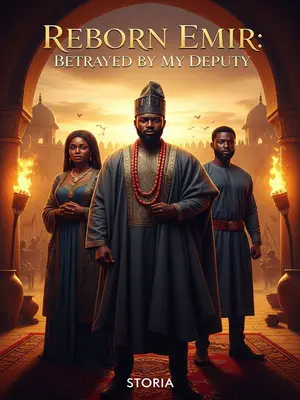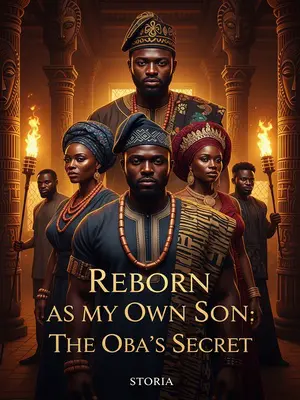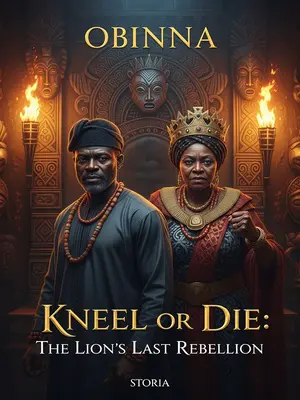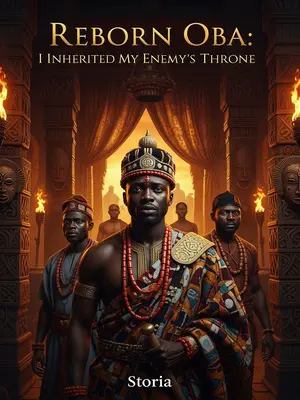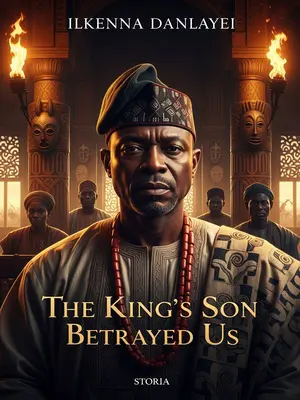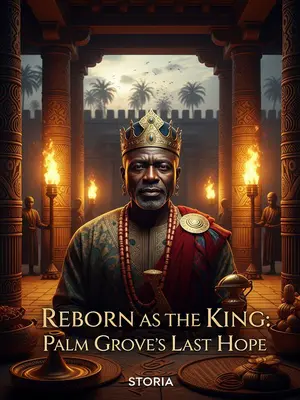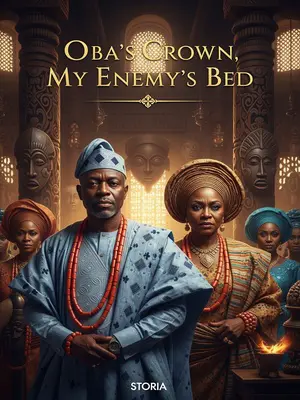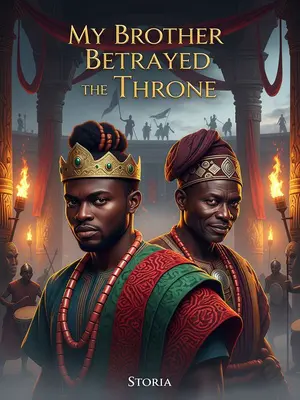Chapter 2: Palace Schemes and Betrayals
This Oyo king, Musa Garuba sabi am well—King Adekunle. For the sake of Northern Campaign, Adekunle join body with big chief Baba Adebisi, talk say make dem give Olumide more honour, make am Chief of Ede, collect all the titles from Chief Badmus, even spoil the man name from "Loyal and Dedicated" to "Fake and Bad."
He remembered how tongues wagged for market square—some say Adekunle dey play politics pass warriors, some say he dey sell old friends for new power. The courtiers themselves dey chop the gossip like roasted maize.
Dem still call the sixty-something Baba Ojo and eighty-year-old Pa Lawal come make morale high.
The elders arrived with their faded beads and tired knees, but their voices still boomed when necessary. Even the youngest drummer in the palace watched these old men, hoping to learn how to stand tall in the face of shame.
But na so e end.
No real general, no army reorganization, even Baba Ojo dem no use am do anything serious for war.
He recalled the way war drums once called men to glory, but now they only announced confusion. The chiefs argued about who would pour libation or lead prayers, but nobody agreed on battle plan. Oyo, the lion of the West, started to look like old goat.
So who Baba Adebisi come use?
The commander for central front never fight war before; the one for east side no sabi anything, but everyday dey compare himself to Sango.
Sango for grave: "..."
If Sango fit wake, maybe thunder for scatter the foolishness of this council. Musa imagined Sango's booming laughter rumbling underground, ready to strike the pretenders.
All these people just dey chase after praise, dey promote only their own people, and before you know am, dem lose everywhere, Nupe army come push them back.
He pictured the council chamber full of flattery and back-slapping, the kind that ruined empires. Musa's lips twisted in a bitter grin—"Na so dem dey do for here too."
Baba Ojo, wey dem no gree make fight, just vex resign, write, "Rush like Ogun, conquer Oyo, but na only to look north dey fear," and "Who I go ask, Pa Olumide old, e fit still chop?"
Sixty-six-year-old Baba Ojo just retire with pain, and over-eighty Pa Lawal dey look north dey miss home.
He saw the two old men on the palace veranda, one staring at his trembling hands, the other gazing north, eyes misty with memories of home. "This Oyo," Baba Ojo grumbled, "no be the one we fight for."
If no be say Baba Zubairu show for eastern front, dey run up and down block Nupe army… Nupe for reach River Niger again.
Baba Zubairu’s name grew like legend among the people. Market women and hunters alike whispered that he moved like spirit, his horse hooves raising red dust that chased the enemy. Musa smiled, knowing that even in failure, some warriors still shine.
So for palace, na peace everybody dey talk—even Queen Morayo dey whisper for bed.
The word 'peace' tasted sour, like unripe fruit. Musa remembered how the chiefs' voices grew soft, like men hiding from harmattan, and even the palace drummers played quiet, uncertain beats.
Baba Adebisi still dey try hold ground.
The west side be Ijebu, Chief Olatunde dey lead. Olatunde family don dey control army for Ijebu since early Oyo—three generations as commanders—na only hope for Northern Campaign from that side.
The Olatunde lineage stood tall in Ijebu tales. Musa pictured their family compound, big as a whole village, palm trees waving in the wind, the air thick with stories of past victories.
Baba Adebisi: "My King, the sons of Ijebu dey brave, dem go win the enemy."
He said it with a voice full of forced hope, but even the youngest palace servant could see his hands shaking. Musa looked into his eyes, searching for a flicker of truth.
Musa Garuba just dey hold him head.
He pressed his palm to his temple, feeling a sharp pain—one that came not from sickness, but from the weight of betrayal. "Oluwa, wetin remain for this house?" he muttered under his breath.
E pain am because he know say the western side na dead end.
The pain felt like a stone in his shoe—small, constant, impossible to ignore. He remembered the market proverbs: "Person wey chop with thief, dey sleep with one eye open."
Chief Olatunde don already plan betray. Before year go finish, e go give four towns to Nupe, send plenty Ijebu and Egba boys to go die, then collect title from Nupe, call himself King of Ijebu.
He remembered Olatunde’s laughter for market day—sweet on top, but knife dey hide for back. Musa's mind flashed to Olatunde's sly smile, the way he greeted everyone with sugar but hid the knife behind his back. "Wetin man no go see for palace?"
Even if Musa Garuba sabi this, Olatunde family don dey rule Ijebu for three generations. If you go accuse them now, e too late, nobody go believe.
He remembered the ancient saying, "Crocodile wey dey river too long, people go forget e fit bite." No one wanted to believe evil about Olatunde, not after so many years of glory.
West wind dey blow; October dey reach. This Northern Campaign don spoil finish.
The air carried the scent of coming rain—wet earth, old leaves. Musa watched as the royal palm trees bent in the wind, as if even nature dey mourn for Oyo.
Musa Garuba just sigh—no wahala. Since I don land for Oyo, I go clean out the useless people, fix the army, in three to five years, still go destroy Nupe and honour the blood of these heroes wey just die.
He straightened his shoulders. Even with all the failures, the fire of hope no go out. He made silent promise to the ancestors—he go bring Oyo back from the brink, or die trying.
Musa Garuba just smile, think: That time wey I still dey my thirties, who fit stop my army?
He remembered youthful swagger, his laughter ringing through camps, young men swearing to follow him to death. "I still get small pepper for body," he thought, grinning at old memories.
Maybe na the smile make Queen Morayo finally talk.
She saw the light return to his eyes, her own hope flickering. She reached out, hesitant, wanting to bridge the distance.
She kneel for bed, dey cry, talk to Musa Garuba: "My King, I know say I no sabi government matter, so even as Baba Adebisi dey look down on me, wan harm you and our pikin, I no stop am from start this Northern Campaign.
But now Oyo dey lose and lose, he still wan fight. I just talk my mind, you come scare me like this… Even if I wrong, you no dey think about my own feelings?"
Her words tumbled out, mixing fear and frustration. "I dey try protect my own too," she whispered. The lamplight flickered over her tear-stained cheeks. Musa could see how palace life weighed on her—one day queen, next day pawn. It touched him, though he tried to hide it.
Musa Garuba look this pitiful Queen Morayo, just dey laugh for him mind.
He chuckled softly to himself, thinking, "Woman matter no dey finish for palace." Her tears reminded him of his mother—how she wept quietly after his father’s death, then wiped her eyes and faced the world with strength.
True kuli-kuli seller—she sabi mix sweet with sharp, never let hand shake.
She knew how to pour emotion, hot and smooth, never letting the cup overflow. Even when her heart broke, she kept her words measured, every phrase a calculated step in palace chess.
To control Adekunle easy, but to use all those tricks for Old Musa? She dey overrate herself.
He grinned, knowing he was not so easily swayed by soft voice and sweet perfume. "I don see real war, real betrayal. All this na small play."
Her tea skills fit high, but Old Musa don read history book.
He remembered the old storytellers for Kofar Mata, their dusty voices warning, "No let fine woman read you like book."
After Northern Campaign fail, Queen Morayo join with Chief Shina (Vice Chief of Rites) and Captain Chinedu (Royal Guard Commander), forge king’s order, kill Baba Adebisi, then go negotiate with Nupe.
He pictured the three in the shadow of the palace, whispering in corners, passing secret notes under calabash covers. It was always the same—power dancing in the dark.
Chief, queen, and guard commander—this kind setup fit even kill king.
He shook his head, thinking how even the bravest lion can fall to cunning foxes and snakes hiding in the grass. "This palace na real jungle," he thought.
So for the next ten years, na Queen Morayo and Chief Shina dey control everything.
He imagined their rule—a mixture of silk and steel. The palace boys would gossip, saying, "See as things dey change—dem no dey fear king again, na queen and chief dey run things."
Musa Garuba just watch her dey act, for him mind he wan cut off this demon queen head.
He clenched his fist, the urge for swift justice burning in his chest. But he held back, remembering how in the land of kings, patience be weapon pass sword.
But he no fit.
He exhaled, knowing some battles no be for cutlass alone. "If I move now, wahala fit scatter everywhere."
This Northern Campaign don spoil, to fix army and make Oyo strong again, he need make all the chiefs calm, plan well.
He decided to hide his true mind, to wear mask of calmness. The fate of Oyo rested not on anger, but on quiet moves—like draft game where one wrong step dey cost everything.
If he kill the demon queen now, e go spoil everything.
He let his anger settle, eyes cold as river in dry season. "Time go reach," he promised himself, "but no be now."
So Musa Garuba just talk soft, say he just dey think another thing, no be say he wan scare her.
His voice came gentle, like grandfather talking to small child. He forced a smile, even as his heart still boil.
"So wetin My King dey think?"
She pressed, hope flickering in her voice, wanting reassurance or at least a hint of mercy.
"I dey think say all those civil and military chiefs useless, all of them suppose die," Musa Garuba talk half-joking.
His words hung in the air, half-laughter, half-threat. Even the air grew tense, as if the room itself dey listen.
Queen Morayo, as she dey wear cloth, just throw am one kind eye—half play, half vex.
She huffed softly, tying her wrapper tighter, her eyes sharp like village market woman who just catch person try price her tomatoes too low. She gave him that look women use when they want to remind you—"I sabi pass as you think."
But truly, na only Baba Ojo Old Musa dey reason. Whether for palace or outside, for council or for war front, the only person wey get sense na Baba Ojo.
He remembered Baba Ojo’s words at council meetings—always blunt, always cutting through lies like machete through grass. The only one who spoke truth, even when e dey burn.
Everybody dey look Nupe as the main wahala for Oyo, but only Baba Ojo write for message say Nupe go soon finish, the real wahala go come from north, even worse. If Middle Belt and Oyo no prepare, na finish be that.
He remembered Baba Ojo’s warning, his finger jabbing at the map, voice hard like stone. "If una no listen now, na cry una go cry later." The words haunted Musa in every quiet moment.
But council no hear anything.
Musa shook his head, thinking, "When elder dey talk, small boy dey play draft." The council had plugged their ears, lost in their own pride.
Na so e pain reach, because Baba Ojo don old, sixty-six, nobody sure if he fit live see another Northern Campaign.
He pictured the old man, white beard shaking, eyes full of regret. "Na so time dey do man," Musa thought, "yesterday warrior, today history."

